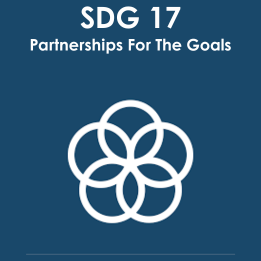
Sustainable Development Goal 17 focuses on partnerships for the goals, emphasizing the importance of collaboration and cooperation to achieve the other Sustainable Development Goals. While IT has the potential to contribute positively to SDG 17 by enabling communication, collaboration, and knowledge-sharing, there are also potential negative contributions or challenges:
Digital Divide: The digital divide refers to the gap between those who have access to modern information and communication technology and those who do not. IT can contribute negatively to SDG 17 if it widens the digital divide, creating disparities in access to technology and hindering collaborative efforts.
Cybersecurity Risks: The increased reliance on IT for communication and collaboration poses cybersecurity risks. Cyberattacks, data breaches, and other security incidents can disrupt partnerships and erode trust among collaborators. These challenges can hinder progress towards achieving the SDGs.
Data Privacy Concerns: The collection and sharing of data in collaborative efforts may raise concerns about privacy. If not handled appropriately, the misuse of personal or sensitive information can lead to a breakdown in trust and hinder effective partnerships.
Dependency on Technology: Excessive reliance on IT can lead to a dependency that may be detrimental in the case of system failures, cyber threats, or other disruptions. This dependency can compromise the resilience of collaborative efforts outlined in SDG 17. With GenAI coming up, too much of dependence on it can turn out to be damaging.
E-Waste and Environmental Impact: The production and disposal of electronic devices contribute to electronic waste (e-waste), which can have detrimental environmental effects. If not managed responsibly, the environmental impact of IT can contradict the goals of sustainable development. This requires participation of ecosystem partners.
Ethical Concerns: The use of IT in partnerships may raise ethical concerns, particularly if technologies are employed in ways that violate human rights, lead to discriminatory outcomes, or contribute to social injustices. Ethical considerations are crucial for maintaining the integrity of collaborative initiatives.
IT plays a crucial role in contributing positively to SDG 17 in several ways
Facilitating Global Collaboration: IT enables instant communication and collaboration across borders. It facilitates global partnerships by connecting individuals, organizations, and governments, fostering collaboration to address common challenges. Sustainability requires an ecosystem to work together cutting across geographic, industry and organizational boundaries.
Data Sharing and Monitoring: IT systems support the collection, analysis, and sharing of data, which is essential for monitoring progress towards SDGs. This helps in identifying areas that need attention and enables evidence-based decision-making for better resource allocation. Data is a critical element and the lack of it is the main reason for Greenwashing.
Digital Platforms for Partnerships: IT platforms provide digital spaces for various stakeholders, including governments, businesses, NGOs, and individuals, to come together and form partnerships. These platforms can be used for knowledge sharing, resource mobilization, and coordination of efforts towards achieving the SDGs.
Financial Technology (Fintech): Fintech innovations, powered by IT, contribute to financial inclusion and can help in achieving SDG 17’s targets related to financing sustainable development. Digital payment systems, crowdfunding platforms, and blockchain technologies can enhance financial transparency and efficiency. Regenerative Finance will need the use of latest technologies and IT.
Capacity Building through E-Learning: IT enables access to educational resources through e-learning platforms, contributing to capacity building and skill development. This, in turn, supports the development of human resources needed to implement and achieve the SDGs.
Open Data Initiatives: Many governments and organizations are adopting open data initiatives, making valuable information publicly accessible. Open data can be a powerful tool for fostering transparency, accountability, and collaboration, all of which are vital for achieving SDG 17.
Digital Innovation for Development: IT-driven innovations, such as mobile applications and technological solutions, can directly address development challenges. For example, mobile health apps can improve healthcare access, and agricultural technology can enhance food security, both of which are essential aspects of sustainable development.
Remote Work and Virtual Collaboration: The adoption of remote work, facilitated by IT, can lead to more inclusive and diverse partnerships. It allows individuals from different geographic locations to contribute to global initiatives without the need for extensive travel, reducing the carbon footprint and promoting environmental sustainability.
